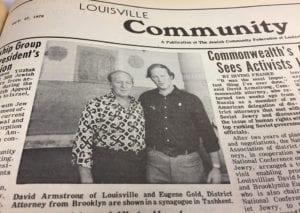
The Community archiving project will enable readers to access past stories from the paper, such as this Oct. 27, 1978, article about Louisville Mayor Dave Armstrong, then a district attorney, and his covert meeting with Soviet refuseniks on a visit to Moscow.
Several years ago, while looking at the many photos that were taken for Community, I began to wonder what will happen to them. Many people in the shots were not identified, although most are preserved by event.
And what about the stories of those events? Copies of Community are bound every year and have been available at the J, but newsprint doesn’t last forever.
In addition, there were many Federation and J files in storage, some containing details about the community that future generations ought to know.
I knew I needed help to find the best way to preserve those documents and photos. I turned to Frank Weisberg and asked him to chair a committee to explore how to create a Jewish Louisville archive. Stuart Goldberg became the vice chair. Frank and Stuart’s passion and vision made the project a reality.
Together, we recruited an enthusiastic group of volunteers to explore the possibilities.
Our first thoughts were to carve out some space at the J and arrange for a volunteer archivist. Quickly, we realized creating a viable archive that adequately preserves all kinds of documents and allows controlled access (so nothing walks out the door) was not feasible.
So, we needed a partner with the resources to undertake a project of this scale. After doing due diligence we decided on The Filson Historical Society, which was ready to work with us to establish a Jewish archive.
The Filson, then led by Executive Director Craig Buthod, made it clear that the organization is a true historical society for Louisville, ready to serve all parts of the community. It actively recruited the Jewish Community of Louisville (JCL) as a partner, meeting with us several times and answering all our questions.
The Filson even modified their Deed of Gift, the document a donor signs when a gift is made to an archive, clarifying that the JCL materials will be collected in a timely manner, stored and maintained like other collections, and provided equitable access.
In addition, The Filson was building a large, multi-story expansion to its archive and was eager to establish the Jewish Community Archive there. The committee was convinced and chose to work with The Filson, which has proven itself an excellent partner.
While our committee was doing its work, the Jewish Heritage Fund for Excellence pursued a similar path, seeking an archive to care for its historical documents. The Filson had asked JHFE for a grant to help establish a Jewish archive. Knowing we were working on establishing a Jewish archive, the JHFE wanted all the documents to be housed in the same place.
After receiving the grant, Abby Glogower was hired as the curator of Jewish collections and the Jewish Community Archive. Possessing a Ph.D. from the University of Rochester, and experience with other museums, including as an exhibition facilitator at the Spertus Museum’s Institute for Jewish Learning and Leadership, Glogower dedicated herself to getting the archive established as a jewel for our community.
She immersed herself in the community, visiting and speaking at many of our Louisville Jewish institutions and congregations, meeting as many people as she could and seeking to ground herself in the community. She exudes energy and enthusiasm.
Glogower’s first assignment for the archive was processing Jewish Hospital’s papers. She worked closely with JHFE to accomplish that task and has already organized programs and exhibits of special interest to Jewish Louisville.
Her next big undertaking is to process the JCL’s archives, including the Federation and the J.
This work is proceeding apace in a space at the Standard Club provided by JHFE for that purpose.
Meanwhile, The Filson has committed to scanning all back issues of Community. Most of the issues are available only as bound copies, though papers dating back to 2013 are accessible as pdfs at the Community webpage, bit.ly/2VK4ctp. Once the scanning is complete, these papers will be searchable and available online.
To be a true Jewish community archive, The Filson will need artifacts – particularly documents – from agencies, organizations and individuals connected with Louisville’s Jewish community. However, space in the archive is limited and the investment that must be made to preserve each item is significant. Glogower works with prospective donors to determine which items are the best fit for the collections.
The Filson has established specific guidelines prospective donors can use to determine if the items they have will fit in with The Filson’s collection. Those guidelines will be presented in a future issue of Community.
The Archive Governance Committee has worked hard, and devoted considerable time to this project. Weisberg has chaired the committee from its inception and continues to do so today.
Stuart Goldberg served as vice chair of the committee for several years.
Fred Joseph recently stepped up to serve as co-chair, spearheading the effort to review the JCL documents.
Other members of the Archive Governance Committee are Alan Engel, Jane Goldstein, Jamie Horowitz, David Leibson, Maxine Rouben, Michael Shaikun, Steve Shapiro, Allan Steinberg, David Weinberg, Ed Weinberg, Allan Weiss, Chuck O’Koon and me, Shiela Steinman Wallace.
Thanks also to J Senior Development Director Angie Fleitz and President & CEO Sara Klein Wagner.


